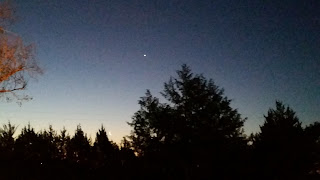STARS
 |
| This was taken at sunrise. The "star" is actually Mercury. |
NATURE CONVERSATION
Enjoy the night sky with your kids (or early morning!), read the Scripture and ask questions. Why did God make the stars? How many stars are there? What did God promise Abraham? Why did that take faith for Abraham to believe? (He did not have ANY children at this point in Genesis.)NATURE JOURNALING
Spend some time under the stars. Not with tons of instruction or for the purpose of positively identifying the constellations. Just be still and enjoy the number of stars and the vastness of the universe.After time observing, your children could draw or take pictures of make notes in the journal of what they see. Or they might be inspired to write a poem or song, or to write the words of a song or poem someone else has written. One song that comes to mind is "Indescribable" by Chris Tomlin.
NATURE STUDY
- Research: how many stars are there? How many visible to man?
- Learn the names of the brightest stars and identify them.
- Learn to identify the planets in the night sky.
- Log/record the position in the sky of planets, particular stars, or constellations. Do this daily or just periodically to observe how the stars "move" across the sky. Or record several times in one evening.
- Visit a planetarium. Learn about the night sky in the other hemisphere of the earth. How is it different in different parts of the earth?





